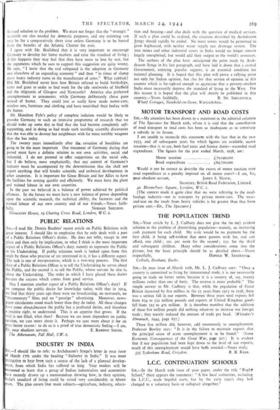Sm,—In your issue of-March roth, Mr. L. J. Cadbury says:
"Once a country is committed to living by international trade, it is not necessarily going to trade on better terms because it is a country of, say, twenty millions rather than one of forty. The reverse is more probable." The simple answer to Mr. Cadbury is that, while the population of Great Britain increased by five million in the 25 years from 1913 to 1938, there was a serious fall in our exports. Between these years total exports fell from 634 to 532 million pounds and exports of United Kingdom goods fell from 525 to 470 million. It is therefore manifest that the addition of these five million people did nothing whatever to increase our foreign trade ; they merely reduced the amount of trade per head. (Whitaker's Almanack, 1944, page 637.) These five million did, however, add enormously to unemployment. Professor Bowley says: " It is in the failure to maintain exports that the principal cause of acute unemployment is to be found." (Some Economic Consequences of the Great War, page 2o7.) It is evident that if our population had been kept down to the level of our exports, much of this unemployment would have beeh avoided.—Yours truly,


























 Previous page
Previous page